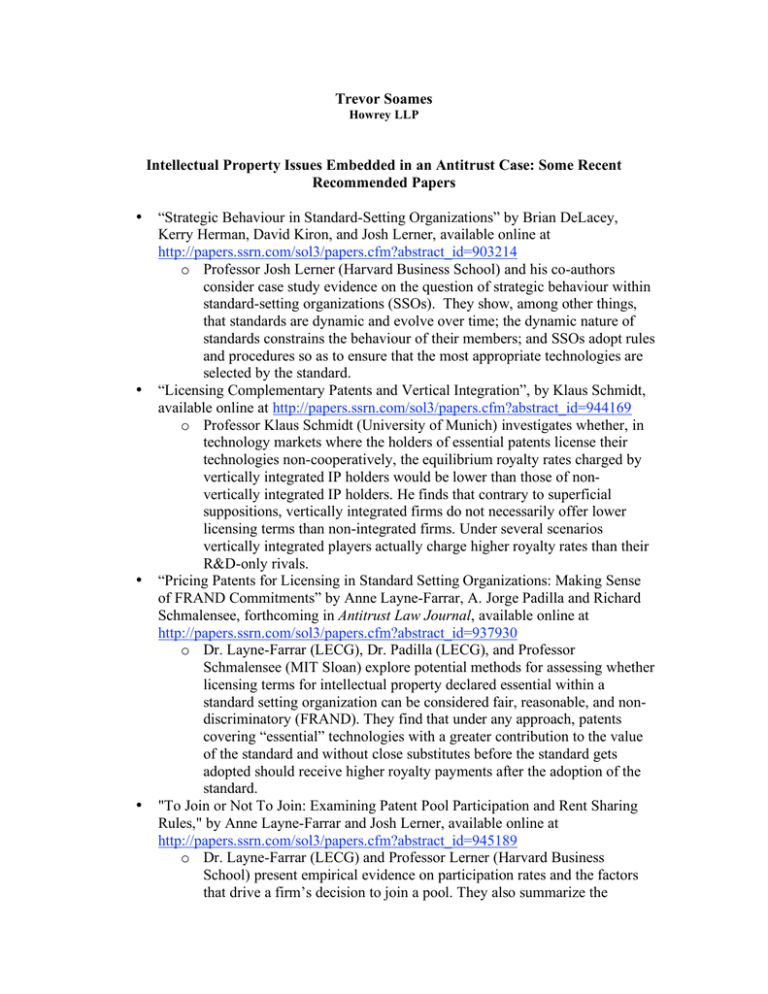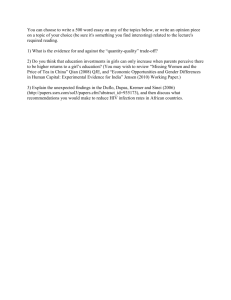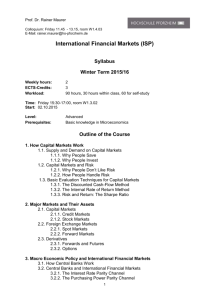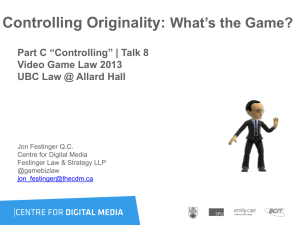Trevor Soames Recommended Papers
advertisement

Trevor Soames Howrey LLP Intellectual Property Issues Embedded in an Antitrust Case: Some Recent Recommended Papers • • • • “Strategic Behaviour in Standard-Setting Organizations” by Brian DeLacey, Kerry Herman, David Kiron, and Josh Lerner, available online at http://papers.ssrn.com/sol3/papers.cfm?abstract_id=903214 o Professor Josh Lerner (Harvard Business School) and his co-authors consider case study evidence on the question of strategic behaviour within standard-setting organizations (SSOs). They show, among other things, that standards are dynamic and evolve over time; the dynamic nature of standards constrains the behaviour of their members; and SSOs adopt rules and procedures so as to ensure that the most appropriate technologies are selected by the standard. “Licensing Complementary Patents and Vertical Integration”, by Klaus Schmidt, available online at http://papers.ssrn.com/sol3/papers.cfm?abstract_id=944169 o Professor Klaus Schmidt (University of Munich) investigates whether, in technology markets where the holders of essential patents license their technologies non-cooperatively, the equilibrium royalty rates charged by vertically integrated IP holders would be lower than those of nonvertically integrated IP holders. He finds that contrary to superficial suppositions, vertically integrated firms do not necessarily offer lower licensing terms than non-integrated firms. Under several scenarios vertically integrated players actually charge higher royalty rates than their R&D-only rivals. “Pricing Patents for Licensing in Standard Setting Organizations: Making Sense of FRAND Commitments” by Anne Layne-Farrar, A. Jorge Padilla and Richard Schmalensee, forthcoming in Antitrust Law Journal, available online at http://papers.ssrn.com/sol3/papers.cfm?abstract_id=937930 o Dr. Layne-Farrar (LECG), Dr. Padilla (LECG), and Professor Schmalensee (MIT Sloan) explore potential methods for assessing whether licensing terms for intellectual property declared essential within a standard setting organization can be considered fair, reasonable, and nondiscriminatory (FRAND). They find that under any approach, patents covering “essential” technologies with a greater contribution to the value of the standard and without close substitutes before the standard gets adopted should receive higher royalty payments after the adoption of the standard. "To Join or Not To Join: Examining Patent Pool Participation and Rent Sharing Rules," by Anne Layne-Farrar and Josh Lerner, available online at http://papers.ssrn.com/sol3/papers.cfm?abstract_id=945189 o Dr. Layne-Farrar (LECG) and Professor Lerner (Harvard Business School) present empirical evidence on participation rates and the factors that drive a firm’s decision to join a pool. They also summarize the • • • various profit sharing rules found in modern patent pools, and explore the consequences of the rule chosen. They find that vertically integrated firms are more likely to join a patent pool and among those firms that do join, those with relatively symmetric patent contributions to a standard appear more likely to accept numeric patent share rules for dividing royalty earnings. "Royalty Stacking In High Tech Industries: Separating Myth from Reality" by Damien Geradin, Anne Layne-Farrar, and A. Jorge Padilla, available online at http://papers.ssrn.com/sol3/papers.cfm?abstract_id=949599 o Professor Geradin (Tilburg University), Dr. Layne-Farrar, and Dr. Padilla assess the academic literature on “royalty stacking”. They find that the conditions necessary for royalty stacking to emerge in an industry are not always present. Moreover, several market mechanisms––such as cross licensing or voluntary patent pools––can be and are often used to mitigate the costs of multiple concurrent patent negotiations. “The Logic and Limits of Ex Ante Competition in a Standard-Setting Environment”, by Damien Geradin and Anne Layne-Farrar, published in Competition Policy International, Vol. 3, No. 1, Spring 2007, available online at http://papers.ssrn.com/sol3/papers.cfm?abstract_id=960063 o Professor Geradin (Tilberg University) and Dr. Layne-Farrar (LECG) critically assess recent policy proposals aimed at eliminating the market power that a standard setting organization might confer on patent holders. The proposals range from ex ante auctions to be held during the standard definition phase to binding ex ante licensing commitments made before any vote on technologies occurs. The authors find that while some proposals contain attractive elements, most are problematic. In particular, many would lead to unintended consequences that imply their costs would exceed any benefits they might attain. “The Ex Ante Auction Model for the Control of Market Power in Standard Setting Organizations,” by Damien Geradin, Anne Layne-Farrar, and A. Jorge Padilla, available online at http://papers.ssrn.com/sol3/papers.cfm?abstract_id=979393 o Professor Geradin (Tilberg University), Dr. Layne-Farrar (LECG), and Dr. Padilla (LECG) take a closer look at the pros and cons of ex ante auctions within standard setting organizations, as proposed in Swanson and Baumol (2005), as mechanisms to reduce any market power that standardization might confer on patent holders. While attractive on theoretical grounds, the authors conclude that when the model accounts for the realities of standard setting, auctions lose most of their luster as solution to potential ex post opportunism.


